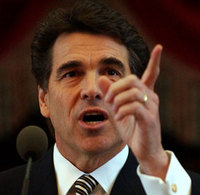Opinion trims Perry's power
March 13, 2007
The power of a governor's executive order was reduced to an executive suggestion in an informal attorney general's opinion, revealed Monday, that Gov. Rick Perry doesn't have the legal authority to order sixth-grade girls vaccinated for a sexually transmitted virus.
Written by Christy Hoppe, Dallas Morning News

Gov. Rick Perry
AUSTIN – The power of a governor's executive order was reduced to an executive suggestion in an informal attorney general's opinion, revealed Monday, that Gov. Rick Perry doesn't have the legal authority to order sixth-grade girls vaccinated for a sexually transmitted virus. The decision did not surprise key legislators and policy opponents who have chafed under Mr. Perry's expansive use of executive orders. Last month, environmentalists won an injunction from a state district judge, who said Mr. Perry could not use such orders to speed up permits for coal-fired plants. Mr. Perry's office dismissed the ruling as the opinion of "a single liberal Austin judge." But Monday came the confirmation – from a fellow conservative Republican attorney general – on Mr. Perry's order regarding the vaccine for human papillomavirus. Because Health and Human Services Commissioner Albert Hawkins still has the ability to order HPV vaccines on his own, lawmakers said they will press ahead with legislation to stop any mandatory HPV vaccination program unless and until it is approved by the Legislature. Such a bill has widespread support and is scheduled for full House debate today. A Senate version awaits action in committee. Mr. Perry's office was taking the informal opinion in stride, saying it does not change how the governor will issue executive orders. "Nothing that happened today is going to cause Gov. Perry to shy away from using every tool at his disposal, including executive orders, to lead this state," said press secretary Robert Black. The furor over executive orders erupted two months ago, after Mr. Perry issued his vaccine order, citing that HPV is the leading cause of cervical cancer. The governor provided an "opt out" for any parents who objected to the vaccine, which treats a sexually transmitted virus. Some legislators said Mr. Perry overstepped his authority and asked Greg Abbott for an attorney general's opinion on how a governor can wield an executive order. Sen. Jane Nelson, R-Lewisville, met with Mr. Abbott and said Monday that his legal opinion is that governors have authority to make "a friendly suggestion" to agency heads about how to use powers that they already have. "The bottom line is that the governor, through an executive order, cannot order an agency to do something that they don't already have the authority to do," Ms. Nelson said. "He has the authority to issue an executive order. It just doesn't have the authority of law," she said. Mr. Abbott's office said it would not comment about the legal advice he provides lawmakers and referred calls to Ms. Nelson. The governor's officials said they have known that executive orders, under the constitutionally restricted governor's office, only carry the power of suggestion. But they pointed out that state agencies have always carried out Mr. Perry's wishes, and he trusts that will continue to happen. "It is true that he could simply make a phone call, send a letter, but I think if it is an issue of such importance that the governor believes it is more appropriate to draw public attention to a particular action, if it rises to that level, then the governor will continue to use executive orders," Mr. Black said. Rep. Dennis Bonnen, R-Angleton, who is carrying the anti-HPV vaccine bill, said he does not believe his proposal is a confrontation with the governor. "The bill's about whether we should be mandating this vaccination, and it makes a clear statement that – at this point in time – until a future Legislature says it should be mandated, we won't do it," Mr. Bonnen said. That is the point, Mr. Black said. "If legislators pursue the course of making the HPV vaccine optional, the effect will be that 65 percent fewer women will be vaccinated against a virus that can cause cancer," he said. "While some would make this debate about the separation of powers, it is about saving lives."
![]()
![]()
Related Stories
![]()
Fair Use Notice
This site contains copyrighted material the use of which has not always been specifically authorized by the copyright owner. We are making such material available in our efforts to advance understanding of environmental, political, human rights, economic, democracy, scientific, and social justice issues, etc. We believe this constitutes a "fair use" of any such copyrighted material as provided for in section 107 of the US Copyright Law. In accordance with Title 17 U.S.C. Section 107, the material on this site is distributed without profit to those who have expressed a prior interest in receiving the included information for research and educational purposes. For more information go to: http://www.law.cornell.edu/uscode/17/107.shtml. If you wish to use copyrighted material from this site for purposes of your own that go beyond "fair use", you must obtain permission from the copyright owner.